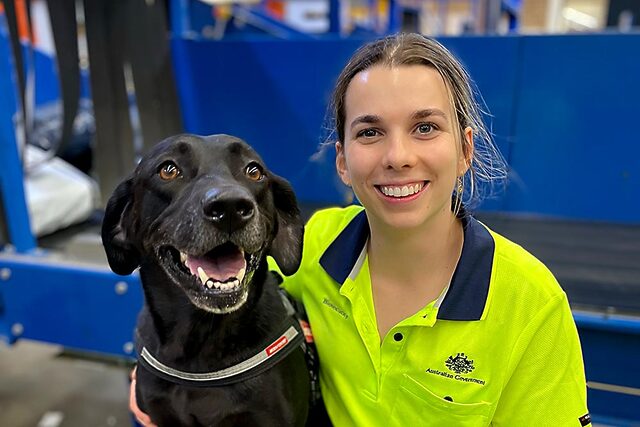Super sniffer Vespa recognised with service award
A Sydney-based detector dog from the Department of Agriculture, Fisheries and Forestry kennel has been named one of the country’s top service animals at the Sydney Royal Easter Show today.
Six-year-old black Labrador Retriever Vespa was honoured with The Australasian Animal Registry Service Dog Award for intercepting 1,300 biosecurity risk items across 129 commodities in 2023, the most of any biosecurity detector dog in the country.
Agriculture, Fisheries and Forestry Secretary Adam Fennessy PSM congratulated Vespa’s handler, Perrie, on receiving the award at the Royal Agricultural Society of NSW’s Canine Hero Awards at the 2024 Sydney Royal Easter Show.
“Congratulations to both Perrie and Vespa on being recognised for their very important work at Sydney’s International Airport and mail centre,” Secretary Fennessy said.
“It takes a special type of person to train and work with our detector dogs, and Perrie and Vespa have displayed exemplary dedication to keeping Australia free from exotic pests and diseases.
“The 2024 Service Dog Award is also a wonderful acknowledgement of the dedication of our biosecurity detector dog teams and the role they play in protecting Australia’s unique biosecurity status.
“Vespa’s results show why detector dogs are highly regarded as a detection tool, and this year she sniffed out finds like beef burgers and smaller items, such as seeds.”
Perrie, who has only worked as a handler for 2 years, said she was inspired to become a detector dog handler while watching the TV show Border Security.
“As a handler, I can pursue my passion for animals and environmental conservation by protecting Australia from exotic pests and diseases,” Perrie said. “I feel a great sense of pride, celebrating the dogs’ successes and seeing the dogs reach new heights with their training.
“I am very lucky to have such a wonderful colleague in Vespa, as she consistently brings a hundred percent to the work she does.”
When she’s not hot on the heels of biosecurity risks, Vespa likes to put up her paws and unwind.
“After a hard day’s work, Vespa likes to sit in the sun and play with her toy or have herself a tummy rub,” Perrie said. “When the weather is warm, Vespa loves to swim in the pool to cool off.”
In the 2022-23 budget, the Australian Government committed $11.7 million to bolster Australia’s biosecurity detector dog capability and strengthen Australia’s biosecurity system by providing 20 additional detector dogs and 20 additional detector dog handlers.
Vespa and friends’ fast facts:
- In 2023, Vespa intercepted 739 biosecurity risk items at Sydney International Airport and 577 at the Sydney Gateway facility (mail centre) including:
- 278 items that could have carried food and mouth disease, a serious animal disease that is currently not in Australia but if an outbreak were to occur it would cost the Australian economy an estimated $80 billion.
- 123 items that could have carried African swine fever, a virus that affects pigs.
- 29 items that could have carried the hitchhiker pest Khapra Beetle, a national priority plant pest that can infest more than 100 different commodities.
- The Department of Agriculture, Fisheries and Forestry currently has 50 biosecurity detector dogs, 52 handlers and 8 detector dog Technical Supervisors working across the country to protect Australia’s biosecurity.
- Biosecurity Detector Dogs are deployed to screen incoming passengers and goods in Australia’s international airports, seaports, and mail centres.
- Biosecurity Detector Dogs are trained to detect 9 target odour groups, which translates into more than 200 biosecurity risk commodities.
- On average, detector dogs intercept up to 45,000 risk items nationally each year.
- The 3 most common items the detector dogs find are seeds, fruit, and meat.
- Labradors, which make up Australia’s entire biosecurity detector dog program, have an extraordinary sense of smell, are co-operative and gentle with people and possess extreme hunt, food and retrieve drives. Their tall stature and agility make it easy for them to screen larger items at airports, seaports, and mail centres.
View Original | AusPol.co Disclaimer
